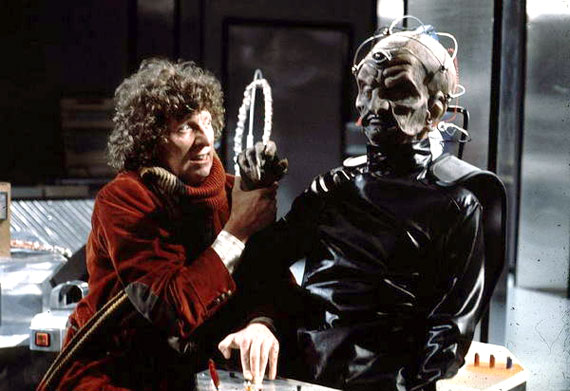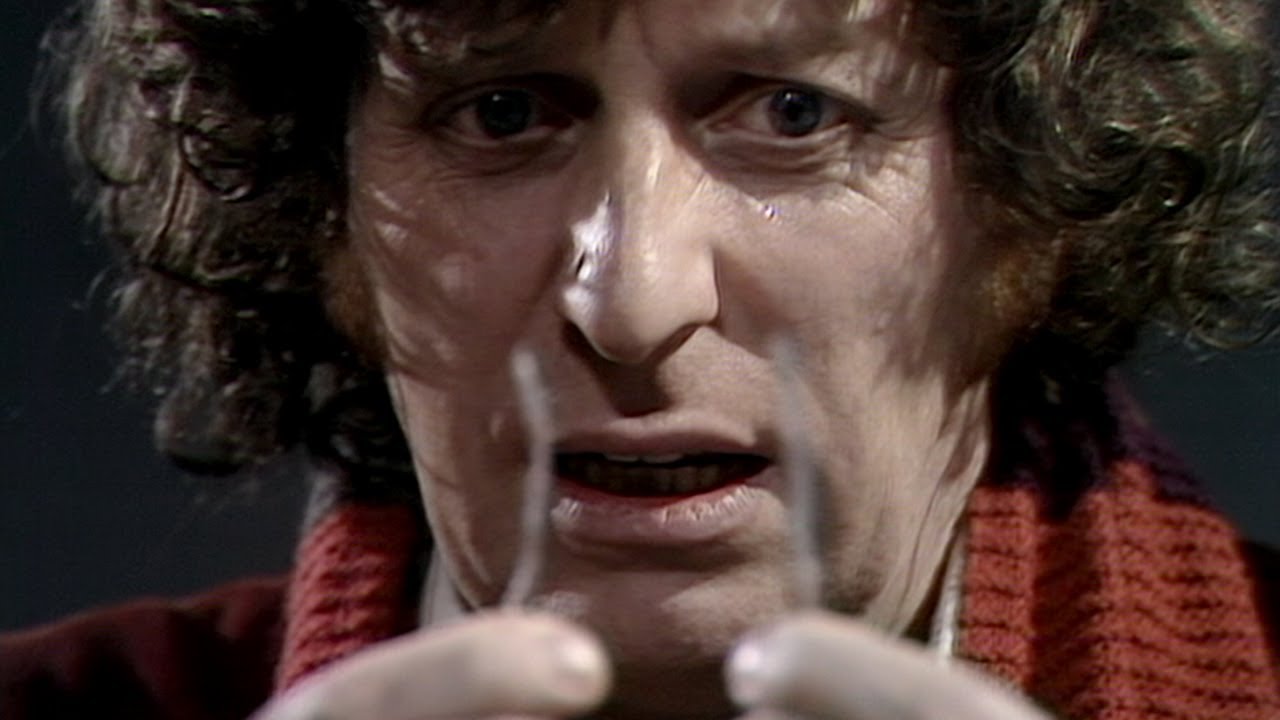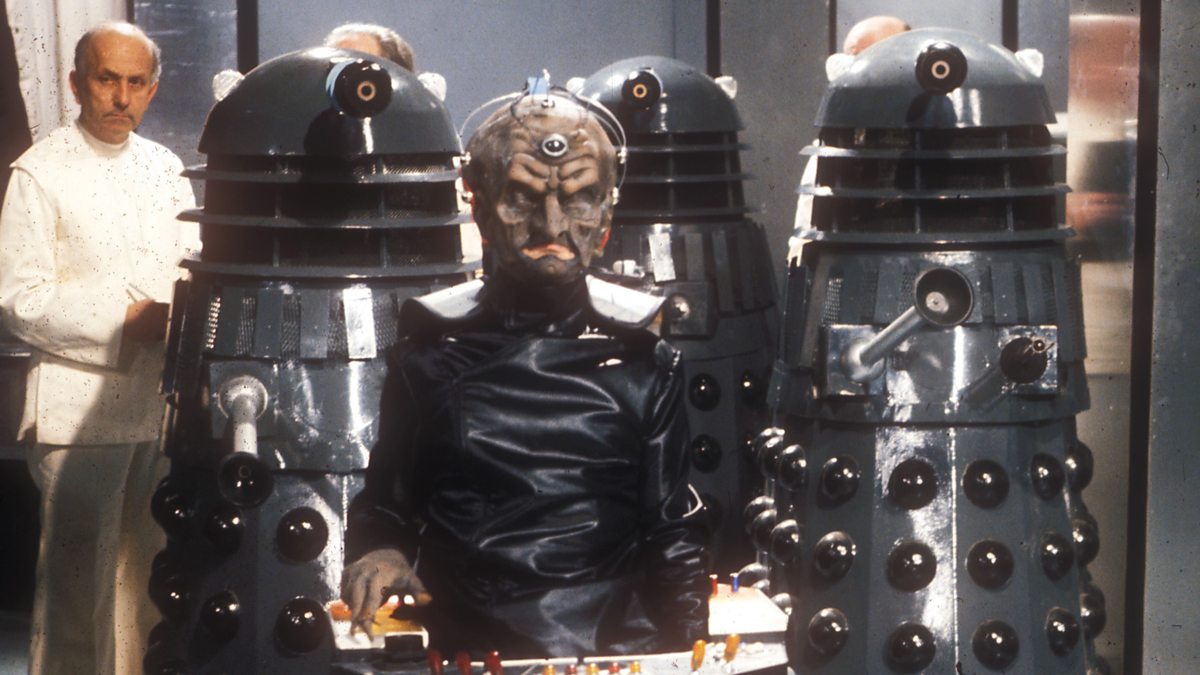The classic Doctor Who story ‘Genesis of the Daleks’ has been released over 20 times across books, videos, DVDs and even vinyl recordings, and it frequently tops fan polls to find the favourite serial. But what is it about this adventure that makes it so popular?

In some ways, ‘Genesis of the Daleks’ is far from a conventional Doctor Who story. For a start, one of the series’ main icons, the TARDIS, doesn’t even feature. This is because ‘Genesis of the Daleks’ comes in the midst of a longer story arc, with the Doctor and his companions having teleported from the Nerva Beacon in the previous tale to deal with the meddlesome Sontarans.
And in this story, their journey has been intercepted by the Time Lords in order to set the Doctor a dangerous mission: to travel back in time to the creation of his old enemies the Daleks and stop them from coming into being, or find a way to make them less evil. The Doctor is given a time ring to return him to the TARDIS once the mission is complete, but otherwise he is travelling (relatively) empty-handed.
Moreover, ‘Genesis of the Daleks’ is much bleaker than one might typically expect from a Doctor Who story. When the Doctor and his companions arrive, they find themselves on the war-torn world of Skaro, home to the Thals and the Kaleds who have been fighting for so long that they have resorted to rudimentary technology in order to survive, relying on World War Two-style artillery and gas masks, and trench warfare. Indeed, the story’s opening scene is a harrowing montage of soldiers being gunned down in slow motion.

In addition, some of the story’s other themes include genetic engineering and genocide – not the first things that come to mind when you think of a Saturday tea time serial for all the family. In fact, the notion of genocide is one that runs throughout the whole of ‘Genesis of the Daleks’ – first with the Kaleds trying to wipe out the Thals, and then with the Doctor trying to decide whether he truly has the right to stop the Daleks – an entire race of living creatures – from ever existing.
The latter idea actually culminates in ‘Genesis of the Daleks’ most famous scene – if not one of the most famous scenes in Doctor Who history. The Doctor has finally found a way to destroy the mutants that will be installed in the Dalek cases, and all he has to do is tap two wires together to exterminate them for all time. “Do I have the right?” he ponders, glaring at the two strands.

It’s a powerful moment, and one that truly gets to the heart of who the Doctor is. He has powers and abilities that elevate him to an almost god-like status, being able to move backwards and forwards in time and (to some degree) being able to decide who lives and who dies. It’s a position of power that comes with a great deal of responsibility, and the Doctor’s question of “Do I have the right?” is one that audiences would also have been asking. Does he have the right? Do any of us have the right?
Again, this moment from ‘Genesis of the Daleks’ is something that is actually very Doctor Who. After all, when the programme was first conceived, its remit was to educate as well as entertain. And whilst there is a difference between education and moral preaching, the Doctor’s question is truly thought-provoking, and the answer is not as black and white as it may seem. Even the Doctor’s companion Sarah Jane Smith tries to persuade him that the destruction of the Daleks is something he shouldn’t even question, owing to the countless deaths they will ultimately cause.
But does this mean that the appeal of ‘Genesis of the Daleks’ lies in its philosophy? Not necessarily. As dramatic as the scene with the wires is, ‘Genesis of the Daleks’ is still an action-packed, science fiction adventure featuring the Mad Man with a Box (even if he doesn’t actually have his Box on this occasion.) Indeed, the story is among many Doctor Who fans’ very first memories of Tom Baker as the Fourth Doctor, if not their first memory of Doctor Who itself.
Certainly, this will have been the very first time some viewers will have seen the Daleks. And even though the Daleks have always been a fan-pleaser, it doesn’t necessarily follow that a Dalek story will go on to become an all-time classic. But in this adventure, they are shown at their simplest, most evil best, indiscriminately exterminating any life form that isn’t Dalek – even going so far as to train their weapons on their own creator.
And what of this creator? Since 1975, Davros has gone on to become (almost) as famous as the Daleks themselves and, arguably, his legend wouldn’t have lasted had he not made such a memorable first impression. In ‘Genesis of the Daleks,’ he is portrayed by the talented Michael Wisher who, despite being hidden behind a rubber mask and confined to a Dalek base with only the use of one hand, manages to dominate every scene he’s in.

And arguably, much of this is down to the gravelly, monotone voice that Wisher gives the demented scientist. The actor went to great lengths to achieve this, even going so far as to rehearse in a kilt with a paper bag over his head so that he could concentrate on his vocal performance. The result was apparently inspired by the mathematician and philosopher Bertrand Russell, with a healthy dose of the villainous Mekon from Dan Dare.
And it is no exaggeration to say that, without Michael Wisher’s performance, ‘Genesis of the Daleks’ would have been a very different story – and the whole of Doctor Who history could look very different today.
There is so much, therefore, to commend ‘Genesis of the Daleks’ for. It is gritty, action-packed, thought-provoking, steeped in series’ lore, dripping with memorable performances – and very unlike many of the Doctor Who stories that came before. Perhaps its stand-out nature is such a large part of its appeal.
But over to you, reader. What do you think is the highlight of ‘Genesis of the Daleks’? And why do you think it has become so highly-regarded among Doctor Who fans? Let me know in the comments below.









Thank you for this clever article.
I need to share a personal remembrance. DOCTOR WHO debuted in the United States in the fall of 1978. It was shown weekdays at 4:30 pm where I lived. The first episodes we saw were the earliest Tom Baker episodes. I saw the last ten minutes of the last episode of “Robot” and was intrigued by it. I tuned in the next day to the first episode of “The Ark In Space”. By the end of that episode I was hooked; I was a fan.
There was simply nothing like it on American television. It was inventive, it was offbeat, it was strangely gothic and it was clear I had come into the middle of something that had been running a long time.
The next installment, “The Sontaran Experiment” introduced us to Major Styre and the ruthless Sontarans and “Genesis of the Daleks” was our first look at the Daleks — despite the fact we’d never seen them before this low-budget but strangely epic production was absolutely mesmerizing and filled with menace.
It was a long time ago but I still remember how seeing these episodes made me feel – DR WHO had hit me like a pile driver and no tv show, before or since, has ever had as big an impact. Thanks to our British friends for this amazing cultural export.
Genesis of the Daleks succeeds on multiple levels. I am obliged to pick you up on the most important one. The Doctor cannot prevent the Daleks from ever existing. That is not his mission. He makes a mocking comment about changing history. He is either checking to see if the Time Lord wants to send him to Alternative Time, a different universe where the outcomes are unknown and he could prevent the creation of Daleks for them. A universe without Daleks being a useful bolt hole. Or he might simply be annoyed and sarcastic at being kidnapped. Altering the past is self preventing. As the Doctor pointed out over and again.
The fascinating thing about Genesis is that is resembles classics set in Earth history such as The Aztecs, Reign of Terror, The Visitation etc. In all these stories the general outcome of events is already known, but that ties the Doctor’s hands considerably. We are reminded that any attempt to shoot Napoleon must fail, the same goes for the Daleks, as we already have seen their rise. All the Doctor can hope to do is follow his mission. Namely to ensure the Daleks have the potential to evolve into more peaceful creatures, or plant an exploitable weakness in them, or finally some flaw so great it will destroy them in the distant future, the part of time that has not been confirmed by the Time Lords.
The Doctor is essentially fighting the tide, much of the outcome he already knows, so is inevitable. We discover why the Thals in The Daleks were descended from warriors, they are the offspring of Thals, Kaleds and Mutos, the latter giving the explanation as to why the Daleks thought them monsters. We get the revelation that this mixed population came about partly because the Doctor tried to warn the Kaleds and Thals of the Dalek threat.
The Doctor fails at the first two options and has to go for the last. He must attempt genocide. Bear in mind he calls it such even though quite a few Daleks are still about. The genocide will take millennia to take effect, if it does. Of course had the Doctor checked Dalek DNA samples in the first Dalek story he would have noticed the results of his handiwork in Genesis. The Daleks have an extremely limited gene pool. This means they were always vulnerable, especially to disease.
We face similar dilemmas with the Dalek history tapes. On first glance they seem worthless, as the losses cannot be reversed. But as a poker player can tell you, knowing when your opponent has a strong hand will win the long game. The Daleks can put in minimal resources to the confirmed lost battles then counter strike at unknown parts of history. Rather than pour everything into the Dalek Invasion of Earth, they send a token force, ready to reinvade as soon as the TARDIS leaves.
Well the TARDIS sort of does ‘appear’ on the LP when the Doctor narrates “I stepped from the TARDIS onto a bleak planet. All around the ground was ravaged”.
There is so much peril. The Doctor being strangled by a Dalek mutant, Sarah dying from radiation, etc. So much betrayal: Nader, Ronson, Davros going back on his orders, giving the secret formula to overcome the dome’s protective formula, the Doctor betraying the future with Dalek defeats, the Daleks betraying Davros. Every time the Doctor might win he doesn’t and Tom Baker expresses this so well, deeper than Pertwee could do.
The lighting is so good it is noticeable making each scene very atmospheric and probably the best story in the classic series. You do feel they are underground in a bunker.
Simple answer to Genesis of the Daleks enduring popularity? The story is well written, introduces a great villan/antagonist and is action paced.
My favourite story Has anyone ever written a history of the Kaled – Thal war?